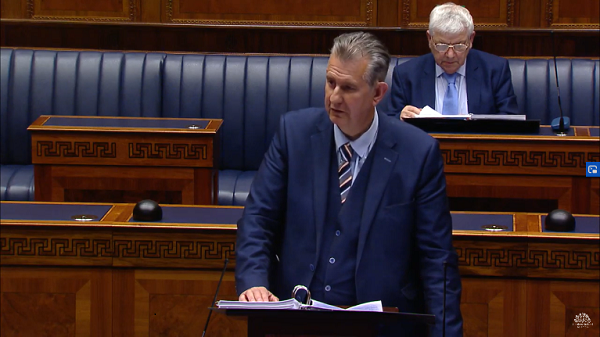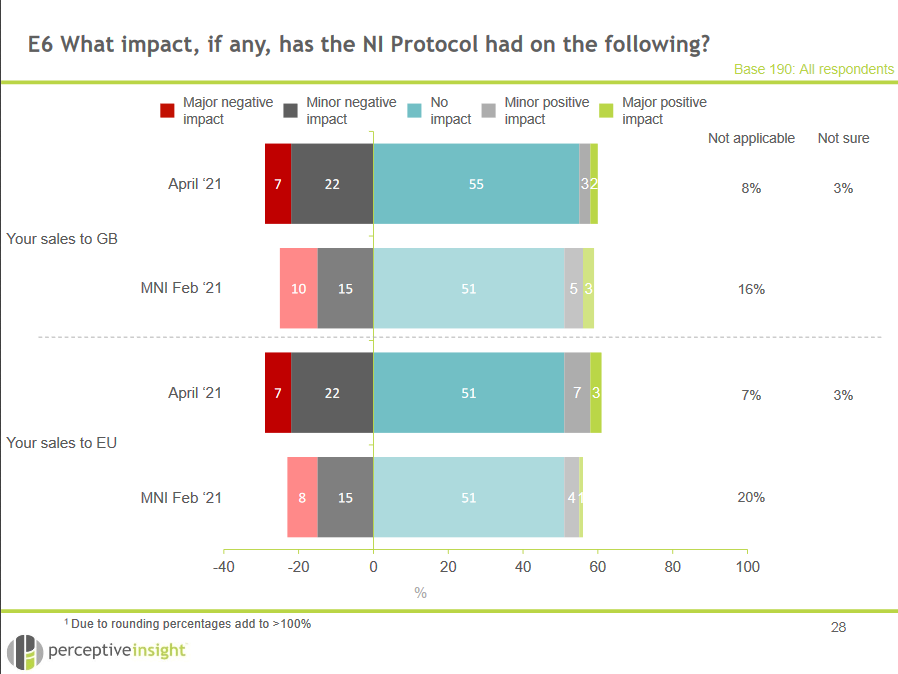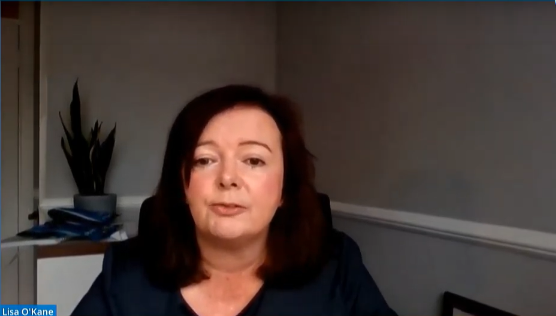Brexit Brief Newsletter
10 May 2021

Welcome to the 10 May 2021 newsletter
Discussions between the EU and UK on the operation of the Protocol on Ireland/Northern Ireland continue, while matters raised at the NI Assembly include a possible veterinary agreement between the blocs. The Committee for Infrastructure has been scrutinising UK Government plans for replacing EU funding. Manufacturing NI has published a survey which includes businesses’ views on the Protocol, while the Department of Agriculture, Environment, and Rural Affairs has published a report on the fishing and seafood sector.
Operation of the Protocol
RTÉ reports that in ongoing discussions on the operation of the Protocol on Ireland/Northern Ireland, the European Commission has rejected a UK proposal which would see the EU taking a more flexible, risk-based approach to food safety and animal health. The broadcaster reports that the Commission has concluded this would “run counter to the EU’s zero-risk approach”. However, the EU is pushing the UK to consider (potentially non-permanent) alignment with EU food safety rules. Agreement on this matter is not expected by the end of May.
At question time in the Northern Ireland Assembly on 4 May, deputy First Minister Michelle O’Neill and Agriculture, Environment and Rural Affairs Minister Edwin Poots were asked about discussions between the EU and UK on a veterinary agreement.
O’Neill said that they regularly raise concerns with the UK and EU, including in relation to SPS checks, pointing out that “any decision on veterinary arrangements for goods checks is the responsibility of the British Government.” She welcomed commitments of the Joint and Specialised Committees to resolve issues and noted some progress “across a raft of issues”.

Minister Poots speaking in the Assembly | Source: NI Assembly
Minister Poots stated that UK alignment with EU standards and regulations on SPS matters is “a possibility and it is for the British Government to consider it.” However, he argued that “It is also a possibility that any goods that are being consumed in Northern Ireland and any product that is coming to Northern Ireland and will remain here will have no detrimental impact on the European Union's single market.” Poots stated that a veterinary agreement “could assist in facilitating trade in live animals and agri-food products, which would be helpful”. However, he noted that because “it would not address the entirety of the rules associated with the implementation of the protocol, it cannot properly address the issue.”
Poots was also asked about his plans for removing the Protocol: he told the Assembly that “an eminent QC was appointed and is scrutinising every aspect of the protocol.” Following this, he intends to lodge judicial proceedings against the protocol and stated he hopes the Department of Economy and Department for Health would join the action.
Manufacturers’ views on the Protocol
A survey conducted by Tughans and Manufacturing NI finds that 38% of businesses think that disruption related to the Protocol is likely to persist to the detriment of their business; 24% are confident that after initial disruption it will be ‘business as usual’, while 16% see NI’s status in UK and EU markets as an opportunity for their business in the medium to long term. 9% see an opportunity for their business now.
Stephen Kelly of Manufacturing NI said that “While 77% said they have experienced a negative impact on their business since the Brexit transition period ended, a growing number are saying they are on top of issues.” Almost half of businesses want the NI Executive to identify and secure new opportunities for their business; the survey found that preparedness and willingness among GB suppliers is the largest issue but EU supplies and sales continue to pose problems. 49% said political uncertainty/climate is an issue for their business.

Manufacturing businesses’ view on the impact of the Protocol | Source: Manufacturing NI/Tughans
Fishing
The Minister for Agriculture, Environment and Rural Affairs has published a major report on the needs of the fishing and seafood sector in Northern Ireland. One of the recommendations of the report is “Taking advantage of EU exit opportunities to build exports of high value seafood to the EU and further afield”.
The report states that while Brexit has changed UK-EU trading arrangements, it has “provided opportunities for the fishing industry in terms of increased market share, access to new markets and greater flexibility in reforming fisheries management to achieve sustainable fisheries.”
In relation to the Protocol on Ireland/Northern Ireland, the report states it is “currently causing issues for east-west trade with GB, but it does give NI exporters a comparative advantage over their GB competitors.” It points out that more paperwork is now required for GB products to show compliance with EU standards. There is “a positive situation for the export-dependent NI seafood sector, without the admin burden or the delays faced by GB exporters that impacts freshness and so price.” The report states that seafood processors “will certainly require help in identifying and accessing new opportunities, as well as adjusting to new arrangements in existing markets.”
Post-Brexit funding
On 5 May, the Infrastructure Committee on Wednesday heard from the Northern Ireland Local Government Association(NILGA) and SOLACE NI on EU successor funding.
In March, the UK Government published details of the Community Renewal Fund (CRF), which will provide £220 million in funding ahead of the introduction in 2022 of the Shared Prosperity Fund(SPF), which replaces EU structural funding.
According to the UK Government, “Investment from EU Structural Funds will continue to be spent by local areas until 2023 and this government has committed to at least matching EU receipts through the new UK Shared Prosperity Fund, on average reaching around £1.5 billion a year.” The Government says it is taking a different approach in delivering the fund to Northern Ireland “which takes account of the different local government landscape in NI compared to Great Britain.” There will be a pre-determined national allocation of £11 million for NI, and the UK Government will run a national competition against the fixed national allocation. The UK government will oversee the project competition directly. Bids will be accepted from a range of local applicants, including but not limited to universities, voluntary and community sector organisations, and umbrella business groups.
Derek McCallan of the NILGA told the Committee that they have been lobbying on EU successor funding for a long period. Lisa O’Kane(NILGA) said there would be little chance to influence the CRF for this year but they want to focus on the Shared Prosperity Fund and ensure it takes into account “co-design at local and regional level.” She expressed the need for greater local scrutiny, pointing out that in GB the Councils have a central role in coordinating bids from different sectors.

Lisa O’Kane of NILGA speaking to the Infrastructure Committee | Source: NI Assembly
On cross-border working, O’Kane said that none of the UK funds currently allow for either North-South or East-West working. Regarding consultation on the funds, O’Kane said they were invited to one meeting in 2018, and their first sight of the fund was when the scheme was launched after the spending review.
On 24 March, the NI Finance Minister Conor Murphy issued a joint statement with his Scottish and Welsh counterparts which raised concerns about the allocation of the funds. The ministers stated that, “we wish to register our shared concerns about the UK Government’s decision to bypass democratically agreed devolution arrangements to deliver the Levelling Up and Community Renewal Funds announced at Budget 2021…we believe monies to replace EU funds should be allocated in full through the Devolved Governments and successful structures that already exist.”
Other news
- Secretary of State for Northern Ireland Brandon Lewis and Ireland Minister for Foreign Affairs Simon Coveney met in Dublin on 5 May. Their discussions covered a range of issues and the pair agreed to convene a meeting of the British-Irish Intergovernmental Conference in June. In a joint statement, they stated “We are aware that there are sincerely held concerns in different communities in Northern Ireland in relation to a number of issues and firmly agree that the best way forward is through dialogue and engagement.”
- Several Unionist leaders involved in negotiating the Good Friday Agreement have written to the UK Prime Minister, Irish Taoiseach, US President, and European Commission Vice-President to express their concern about the Protocol on Ireland/Northern Ireland. The signatories include Lord Trimble and Lord Empey. The letter states “The protocol completely disrespects the territorial integrity of the United Kingdom. Consequently, you are collectively guilty of exceptional anti-democratic behaviour, of breaking a fundamental principle of international law, and are imperilling the very peace process you claim to want to protect and preserve.”
- The European Commission has published a communication to the European Parliament and Council on its assessment of the UK’s application to re-join the Lugano Convention. The Lugano Convention is an international legal pact which defines the jurisdiction of national courts in cross-border civil and commercial disputes, and ensures judgements can be enforced across borders. The Commission finds that the EU should not consent to the accession of the UK to the convention, stating it is “a flanking measure of the internal market and related to the EU-EFTA/EEA context”. The Commission says the UK is a “third country without a special link to the internal market”, stating “there is no reason for the European Union to depart from its general approach in relation to the United Kingdom.”
This Week at the Assembly
- Monday 10 May, 2pm – Plenary - Question Time: Economy
- Wednesday 12 May, 3pm - Committee for The Executive Office - UK Exit from EU - Oral Evidence: EU Matters Update
- Thursday 13 May, 12pm – Committee for Agriculture, Environment and Rural Affairs - EU Exit legislation; Written Briefing DAERA-EU Transition Update
Catch up with the Committees
- Tuesday 4 May, 2pm – Plenary - Question Time - The Executive Office; Agriculture, Environment and Rural Affairs
- Wednesday 5 May, 10am - Committee for Infrastructure - Briefing from the Northern Ireland Local Government Association & SOLACE NI - EU Successor Funding
- Thursday 6 May, 2pm – Committee for Agriculture, Environment and Rural Affairs -Withdrawal of DAERA and Local Authority Staff from Ports - Oral Evidence from PSNI, and Mid and East Antrim Borough Council; Written briefing from DAERA on EU Exit legislation



